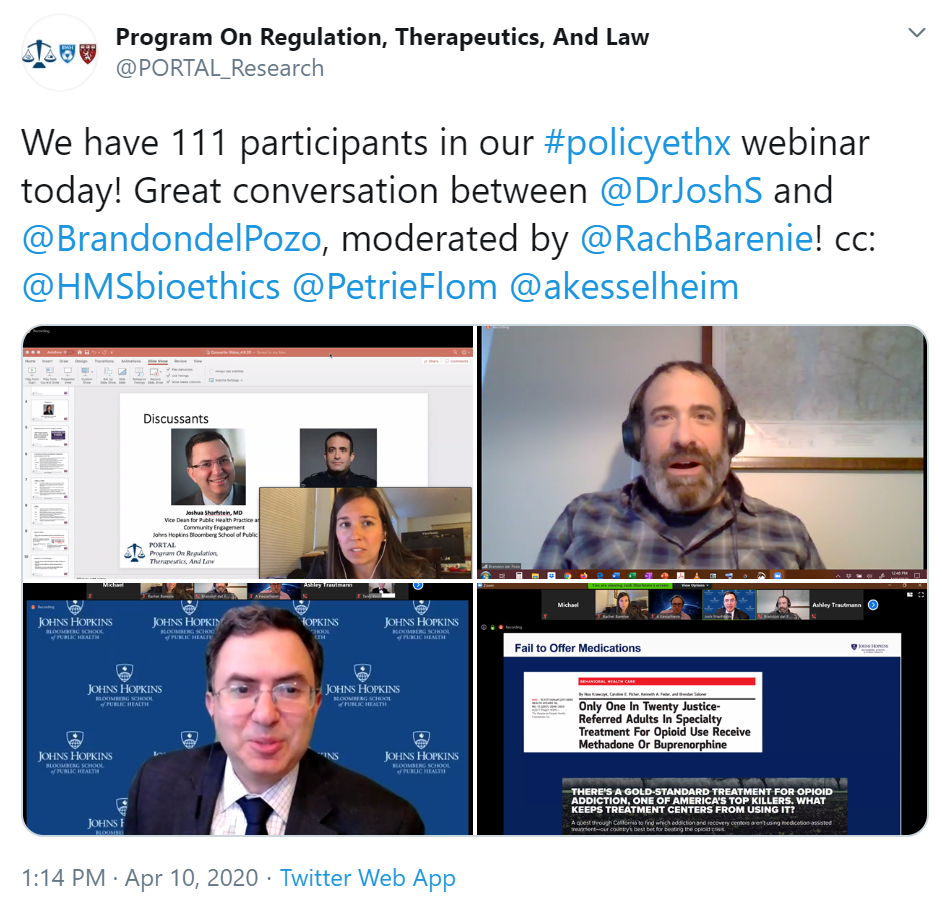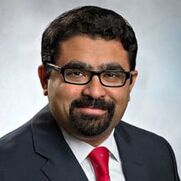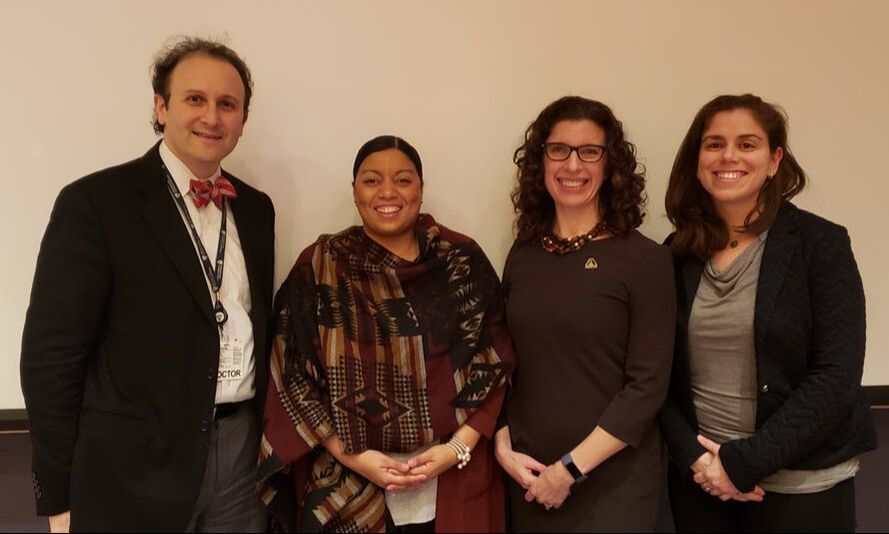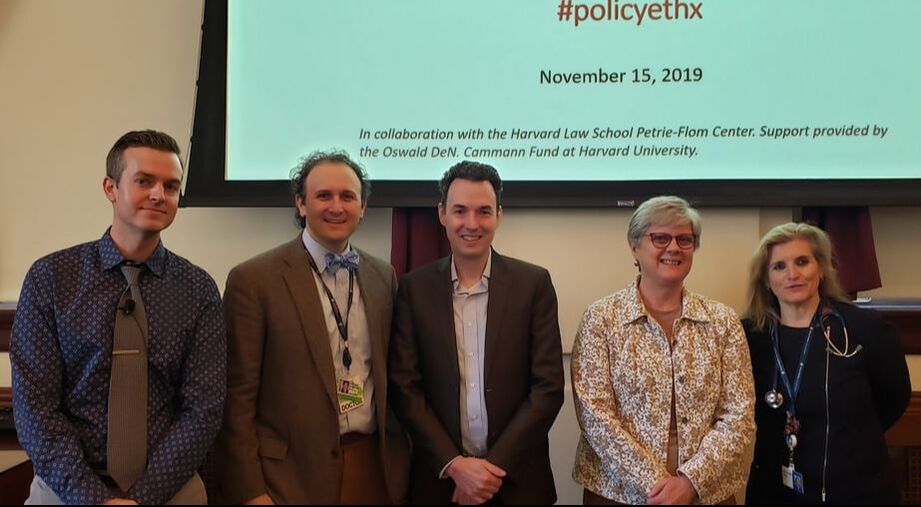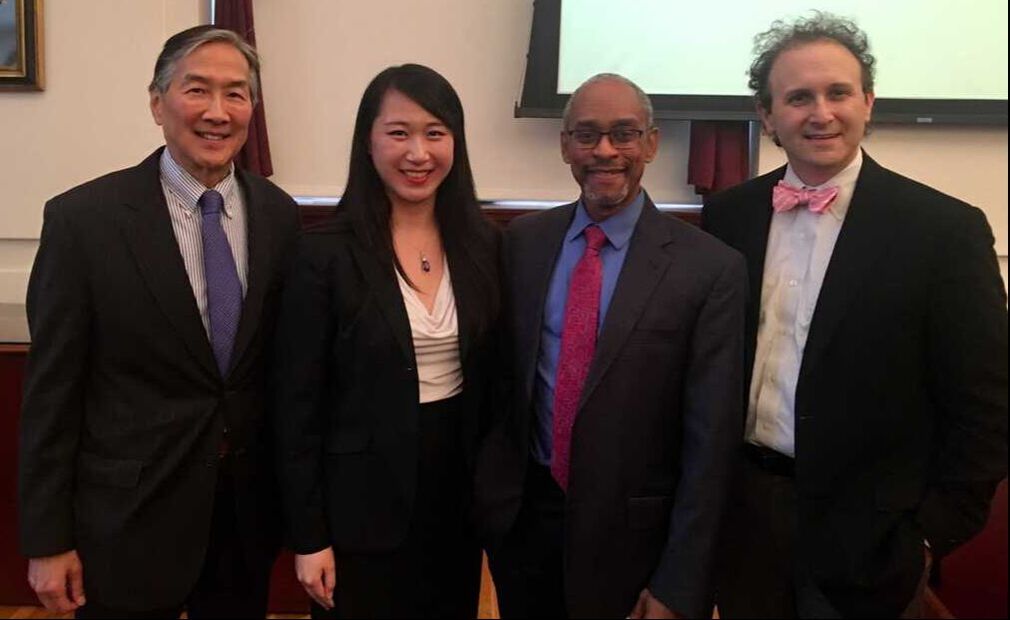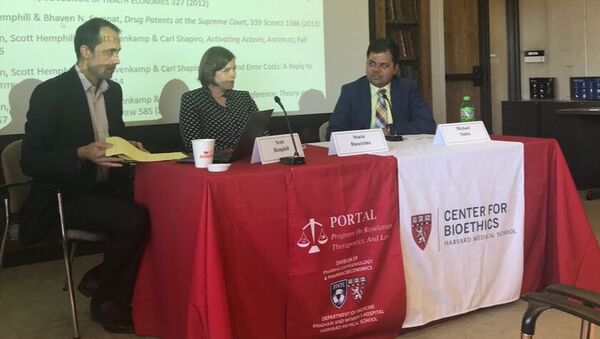Health Policy & Bioethics Consortia 2019-2020
PORTAL runs a monthly seminar series that convenes two experts from different fields or vantage points to discuss how various aspects of therapeutic development and use are affected by ethical norms, laws, and regulations. These are organized in conjunction with the HMS Center for Bioethics supported by the Oswald DeN. Cammann Fund at Harvard University.
You may join the discussion on Twitter before, during, or after each event by following @PORTAL_Research and using the hashtag #policyethx.
You may join the discussion on Twitter before, during, or after each event by following @PORTAL_Research and using the hashtag #policyethx.
PAST EVENTS
Addressing the Public Health Crisis at Border Detention Centers
May 8, 2020 | Harvard Medical School
In the last few years, the process through which refugees from other countries seek to gain asylum in the US has been characterized by family separation, extended detentions, and reports of dangerous conditions. What is the role of physicians and other health care providers in these environments, and what sort of ethical and clinical dilemmas do they face? What are the ways out of this crisis?
May 8, 2020 | Harvard Medical School
In the last few years, the process through which refugees from other countries seek to gain asylum in the US has been characterized by family separation, extended detentions, and reports of dangerous conditions. What is the role of physicians and other health care providers in these environments, and what sort of ethical and clinical dilemmas do they face? What are the ways out of this crisis?
|
|
EXPERTS:
George Annas, J.D., M.P.H. William Fairfield Warren Distinguished Professor and Chair Department of Health Law, Bioethics & Human Rights, Boston University School of Public Health Katherine McKenzie, M.D. Director, Yale Center for Asylum Medicine Department of Internal Medicine, Yale School of Medicine Katherine Peeler, M.D. Medical Director, Harvard Medical School Asylum Clinic Division of Medical Critical Care, Boston Children's Hospital MODERATOR: J. Wesley Boyd, M.D., Ph.D. Co-founder, Human Rights and Asylum Clinic, Cambridge Health Alliance Associate Professor of Psychiatry, Harvard Medical School |
Addiction: A Paradigm Shift from Problem to Patient through Policy
April 10, 2020 | Harvard Medical School
Addiction is one of numerous public health crises facing the US today. Treatment for severe substance use disorders (i.e., addiction) has evolved over time as science has advanced to better understand addiction as a chronic disease, acceptance of evidence-based practice guidelines, and availability of safe and effective treatments. Patients, however, still face barriers to engaging treatment for a variety of reasons (e.g., cost, stigma, limited resources), some of which will be explored in greater depth in this session. Thus, efforts to craft better policies that improve access to and affordable care for substance use disorder treatments are important.
April 10, 2020 | Harvard Medical School
Addiction is one of numerous public health crises facing the US today. Treatment for severe substance use disorders (i.e., addiction) has evolved over time as science has advanced to better understand addiction as a chronic disease, acceptance of evidence-based practice guidelines, and availability of safe and effective treatments. Patients, however, still face barriers to engaging treatment for a variety of reasons (e.g., cost, stigma, limited resources), some of which will be explored in greater depth in this session. Thus, efforts to craft better policies that improve access to and affordable care for substance use disorder treatments are important.
|
EXPERTS:
Joshua Sharfstein, M.D. Vice Dean for Public Health Practice and Community Engagement Johns Hopkins Bloomberg School of Public Health Brandon del Pozo, Ph.D., M.P.A., M.A. Chief of Police (Retired) Burlington, Vermont MODERATOR: Rachel Barenie, Pharm.D., M.P.H., J.D. Postdoctoral Fellow, Program On Regulation, Therapeutics, And Law (PORTAL) |
Private Funding of Drug Discovery: Ethical Issues, Practical Alternatives
March 13, 2020 | Harvard Medical School
The traditional model for drug development begins with publicly-funded science based in academic or government laboratories before private investors and for-profit pharmaceutical manufacturers become involved with their substantial expertise and resources. This for-profit drug development model has also been criticized for leaving certain public health issues unaddressed, particularly diseases prevalent in low-resource settings. What is the viability of other alternatives for funding drug discovery and development?
March 13, 2020 | Harvard Medical School
The traditional model for drug development begins with publicly-funded science based in academic or government laboratories before private investors and for-profit pharmaceutical manufacturers become involved with their substantial expertise and resources. This for-profit drug development model has also been criticized for leaving certain public health issues unaddressed, particularly diseases prevalent in low-resource settings. What is the viability of other alternatives for funding drug discovery and development?
|
EXPERTS:
|
MODERATOR:
|
Soda Taxes and Other Policy Responses to the Obesity Epidemic
February 14, 2020 | Harvard Law School
In recent years, some cities have tried to impose soda taxes and other new policies to reduce the obesity epidemic in the US—particularly among children—and its critical impact on society and the health care system. How effective are these policies? What is blocking their uptake? What alternatives should we consider?
February 14, 2020 | Harvard Law School
In recent years, some cities have tried to impose soda taxes and other new policies to reduce the obesity epidemic in the US—particularly among children—and its critical impact on society and the health care system. How effective are these policies? What is blocking their uptake? What alternatives should we consider?
|
EXPERTS:
Emily Broad Leib, J.D. Assistant Clinical Professor of Law Director Food Law and Policy Clinic Deputy Director, Center for Health Law and Policy Innovation Harvard Law School Steven Gortmaker, Ph.D. Professor of the Practice of Health Sociology Harvard T.H. Chan School of Public Health MODERATOR: Carmel Shachar, J.D., M.P.H. Executive Director, Petrie-Flom Center for Health Law Policy, Biotechnology, and Bioethics Harvard Law School |
Gun Violence: The Health Care System's Role in a Public Health Epidemic
December 13, 2019 | Harvard Medical School
There is an epidemic of gun violence in the United States. Physicians are often on the front-line, but what can the health care system do to stem the epidemic? What evidence do we have about various legal options? And how do we implement change?
December 13, 2019 | Harvard Medical School
There is an epidemic of gun violence in the United States. Physicians are often on the front-line, but what can the health care system do to stem the epidemic? What evidence do we have about various legal options? And how do we implement change?
|
EXPERTS:
Megan Ranney, MD, MPH Associate Professor of Emergency Medicine, Warren Alpert Medical School Chief Research Officer, American Foundation for Firearm Injury Reduction in Medicine (AFFIRM) Rep. Liz Miranda Massachusetts State Representative 5th Suffolk District MODERATOR: Chana Sacks, MD, MPH General Internist, Massachusetts General Hospital Instructor in Medicine, Harvard Medical School Co-Director, Mass General Center for Gun Violence Prevention |
Biomarkers in Cancer Drug Approvals: New Opportunities and Challenges
November 15, 2019 | Harvard Medical School
The FDA recently approved Keytruda and Vitrakvi, two cancer drugs targeting biomarkers without reference to the site of the disease. Defining cancer in terms of biomarkers alone may require us to rethink the design of clinical trials and raises challenges for the traditional FDA approval process.
What is the future of these so-called "tumor-agnostic" therapies, and how will they be translated into effective treatment options in cancer and other diseases?
November 15, 2019 | Harvard Medical School
The FDA recently approved Keytruda and Vitrakvi, two cancer drugs targeting biomarkers without reference to the site of the disease. Defining cancer in terms of biomarkers alone may require us to rethink the design of clinical trials and raises challenges for the traditional FDA approval process.
What is the future of these so-called "tumor-agnostic" therapies, and how will they be translated into effective treatment options in cancer and other diseases?
|
EXPERTS:
Steven Lemery, MD, MHS Associate Deputy Director, Center for Drug Evaluation and Research, U.S. Food and Drug Administration Lisa McShane, PhD Associate Director, Division of Cancer Treatment and Diagnosis, National Cancer Institute Deborah Schrag, MD Chief, Division of Population Sciences, Department of Medical Oncology, Dana-Farber Cancer Institute Professor of Medicine, Harvard Medical School MODERATOR: Spencer Hey, PhD Faculty &Co-Director of Research Ethics, Center for Bioethics, Harvard Medical School Research Scientist, Brigham and Women's Hospital |
The Past and Future of Tobacco Regulation
October 11, 2019 | Harvard Medical School
After decades of efforts to better regulate the sale of tobacco products, the US has finally seen reductions in overall smoking levels. However, new dangers emerging from growing use of electronic cigarettes have threatened some of these public health advances, leaving the FDA and legislators scrambling. What lessons can we learn from past efforts to market tobacco products and past efforts to regulate them that we can apply to the current challenges in this field?
October 11, 2019 | Harvard Medical School
After decades of efforts to better regulate the sale of tobacco products, the US has finally seen reductions in overall smoking levels. However, new dangers emerging from growing use of electronic cigarettes have threatened some of these public health advances, leaving the FDA and legislators scrambling. What lessons can we learn from past efforts to market tobacco products and past efforts to regulate them that we can apply to the current challenges in this field?
|
EXPERTS:
Howard Koh, MD, MPH Harvey V. Fineberg Professor of the Practice of Public Health Leadership Harvard T.H. Chan School of Public Health Keith Wailoo, PhD Henry Putnam University Professor of History and Public Affairs Princeton University MODERATOR: Lois Sheng Liu, JD, MSc Postdoctoral Fellow Program On Regulation, Therapeutics And Law Brigham and Women's Hospital |
Playing Games in the Prescription Drug Market: Cost Implications and Legal Solutions
September 13, 2019 | Harvard Medical School
High drug prices increase health care spending and cause substantial stress on patients. An important antidote to high prices is the introduction of low-cost generic drugs. However, brand-name drug manufacturers have employed various strategies to delay generic entry and undermine price competition, from forcing patients to switch to new formulations to transferring their patents to Native American tribes. What are the ethical implications of these strategies? What is their economic toll? How can we change the law to ensure that the generic drug market remains effective in delivering low-cost options for drugs and biologics?
September 13, 2019 | Harvard Medical School
High drug prices increase health care spending and cause substantial stress on patients. An important antidote to high prices is the introduction of low-cost generic drugs. However, brand-name drug manufacturers have employed various strategies to delay generic entry and undermine price competition, from forcing patients to switch to new formulations to transferring their patents to Native American tribes. What are the ethical implications of these strategies? What is their economic toll? How can we change the law to ensure that the generic drug market remains effective in delivering low-cost options for drugs and biologics?
|
EXPERTS:
Stacie B. Dusetzina, Ph.D. Associate Professor of Health Policy and Ingram Associate Professor of Cancer Research Vanderbilt University School of Medicine C. Scott Hemphill, J.D., Ph.D., M.Sc. Professor of Law NYU School of Law MODERATOR: Michael S. Sinha, M.D., J.D., M.P.H. Research Fellow, Harvard-MIT Center for Regulatory Science Affiliate Researcher, Program On Regulation, Therapeutics, And Law (PORTAL) Harvard Medical School |
|
Program On Regulation, Therapeutics And Law (PORTAL)
Division of Pharmacoepidemiology and Pharmacoeconomics 1620 Tremont Street, Suite 3030 Boston, MA 02120 |


